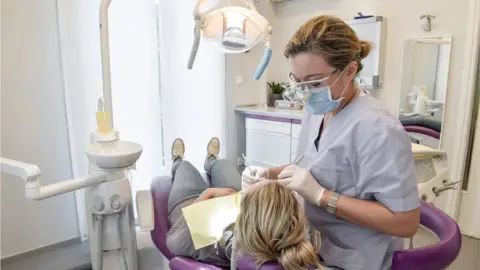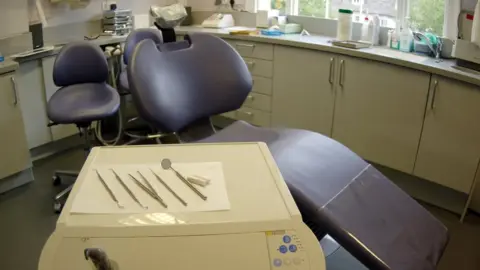Covid: Dentists 'may have to close' without more support
 Getty Images
Getty ImagesSome dental practices could close as a result of the pandemic, the British Dental Association (BDA) Scotland and the Royal College of Surgeons of Edinburgh (RCSEd) has warned.
The number of patients dentists can treat has been cut by rules to stop the virus from spreading.
The RCSEd has warned that for NHS work the government was "providing very little towards treatment".
But the Scottish government said the sector has had "unprecedented support".
Prof Philip Taylor, of the Faculty of Dental Surgery at RCSEd, said that for NHS work the government was "providing very little towards treatment".
Fees are complex and can vary with each patient, but a dentist who fits a new metal crown for a back tooth on the NHS may receive a fee set by government of £80 to £100 - with the patient paying most of that.
However, if the work was done privately, the RCSEd said the dentist could charge £300 to £400.
Dentists whose businesses rely on NHS patients have warned that they are struggling to stay afloat with so few patients coming through the door.
 PA Media
PA MediaUnder strict Covid protocols, treatment rooms must be thoroughly cleaned between patients and need to be left empty for a period of time after some procedures.
This has cut the number of patients dentists can see, and those who rely on slim margins from NHS patients have warned that they may close their practices.
Prof Taylor warned that practices closing down would create an access problem for patients.
Many of those that closed were likely to be the ones most dependant on NHS fees - often in poorer parts of big cities - he added.
One dentist told BBC Scotland the number of patients his practice could see in a day had been cut from 100 to 20.
Fewer patients, he said, meant less income.
"I think we are in a dental health crisis," said David McColl, of BDA Scotland.
"You might see more practices saying we can't afford to run a service like this with NHS funding and turn private.
"Then you'd have a two-tier system where if you can afford it you can get the treatment, if you can't, you won't."
He added: "We want to get back to treating our patients and have a fair system that is not target-driven.
"None of us wants this two-tier system - we need universal access for all".
Investment in dental care
But the Scottish government has said it is committed to ensuring all NHS patients who want to access NHS dental services continue to receive treatment.
Scotland's chief dental officer, Tom Ferris, said that from 1 November all NHS treatments had been allowed again.
He said: "If an NHS patient has been offered or provided with private dental treatment then their dentist must be able to confirm that all available and appropriate NHS alternative treatments have been discussed with the patient and informed consent obtained."
Mr Ferris added that where a dentist had decided to reduce or altogether withdraw their NHS dental service, then suitable alternative arrangements would be put in place for patients.
On the funding the government had made available to dentists during the pandemic, he said: "The government is continuing to provide an unprecedented amount of financial support to ensure the continuity of NHS dental services."
Guaranteed income
He said payments worth up to £12m per month were being made to support the incomes of NHS dental practices.
"As well as deploying the Scottish government budget for NHS dental services, we are investing an additional £2.75m per month."
He added that dentists had been receiving a guaranteed income of 80% of gross fees during the pandemic, which had been increased to 85% from 1 November.
PPE for dentists providing NHS care has also been provided through public money, where they previously provided this themselves.
Mr Ferris added that in December a 2.8% pay rise for dentists would be backdated to April.
''We are working to ensure NHS dental services emerge from this crisis well placed to care for the oral health of the population and will continue to work collaboratively with the dental sector in developing a new model of care," he added.


